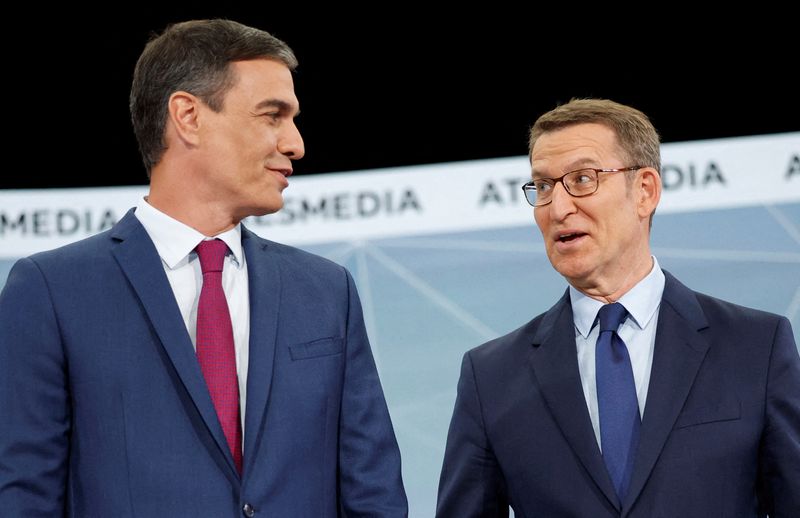
© Reuters. Spanish People’s Party candidate Alberto Nunez Feijoo and Spain’s Prime Minister and Socialist candidate Pedro Sanchez talk before a televised debate ahead of snap election in Madrid, Spain, July 10, 2023. REUTERS/Juan Medina
2/3
MADRID (Reuters) – Spain’s Socialist Prime Minister Pedro Sanchez and Alberto Nunez Feijoo, leader of the conservative People’s Party (PP), embarked on a high-energy live television debate on Monday, ahead of a national election on July 23.
The pair tore into each other from the outset, when asked to talk about the economy – waving bar charts, speaking over each other, and citing markedly different metrics for inflation, employment and economic growth.
Sanchez pointed to Spain’s gross domestic product growing 4.2% in the first quarter of 2023 and highlighted that Spain is one of the few European countries that has managed to bring inflation below 2% – the price target set by the European Central Bank – by 2023.
“Are we perfect? No, but we are going in the right direction and we can’t make any sudden turns,” he said. “You (Feijoo) want to put a brake on the economy that’s advancing at speed.”
Feijoo challenged Sanchez on his claim that the economy was moving “like a motorbike”.
“That shows a lack of respect to Spaniards,” Feijoo said, citing people struggling to afford their weekly groceries.
Opinion polls see Feijoo as the likely winner, but he will probably need the support of far-right party Vox.
Some surveys, though, show the Socialists (PSOE) closing the gap just over a month since Sanchez announced the snap election following regional elections in which his party underperformed.
Jose Miguel Contreras, Professor of Communication at Madrid’s King Juan Carlos University, said the debate was taking place “at a delicate moment in the electoral process.”
“There is a party ahead and in cases like this the influence of a TV debate can be decisive,” he said.
The late-night debate was broadcast simultaneously on the right-wing Antena 3 and laSexta, which is aimed at a left-wing audience. Both channels are owned by Atresmedia.
The PP has 31% support compared to 28% for the PSOE, according to a YouGov poll of 10,480 people carried out between June 29 and July 6. Vox and the far-left Sumar, both potential minority partners of the PP and PSOE respectively, were tied with 14% of the vote.
The PP has few other potential parliamentary allies beyond Vox, while the PSOE could govern as a minority with occasional agreements with several other parties.





